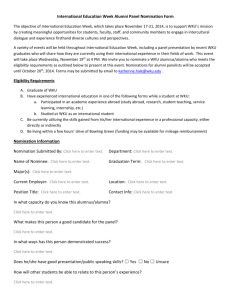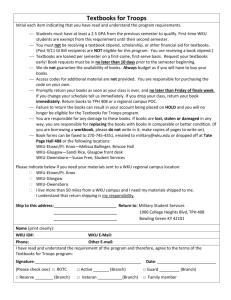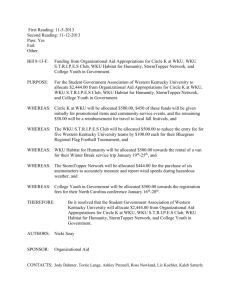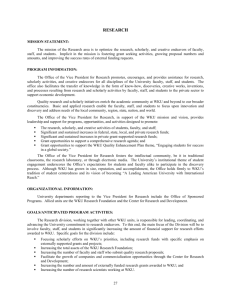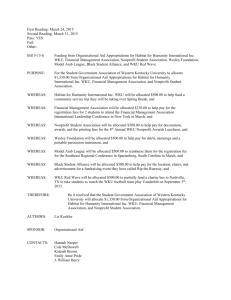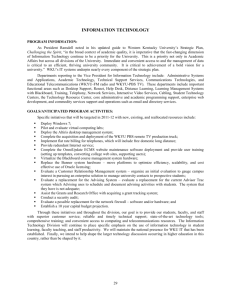Is this Buzz for You? - Western Kentucky University
advertisement
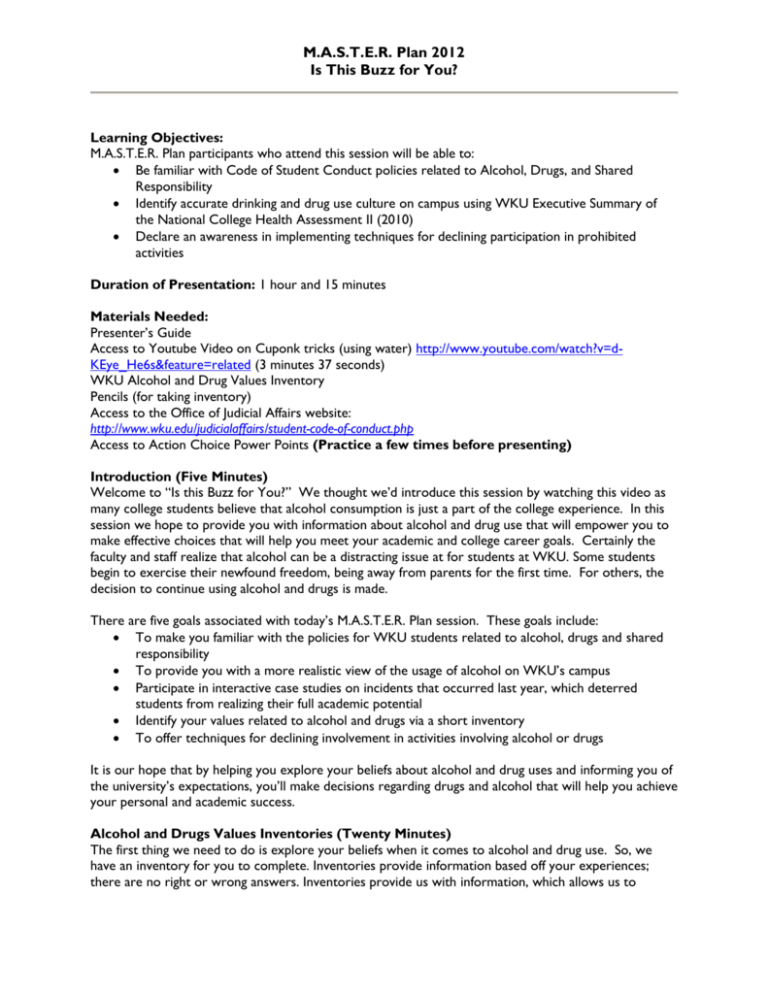
M.A.S.T.E.R. Plan 2012 Is This Buzz for You? Learning Objectives: M.A.S.T.E.R. Plan participants who attend this session will be able to: Be familiar with Code of Student Conduct policies related to Alcohol, Drugs, and Shared Responsibility Identify accurate drinking and drug use culture on campus using WKU Executive Summary of the National College Health Assessment II (2010) Declare an awareness in implementing techniques for declining participation in prohibited activities Duration of Presentation: 1 hour and 15 minutes Materials Needed: Presenter’s Guide Access to Youtube Video on Cuponk tricks (using water) http://www.youtube.com/watch?v=dKEye_He6s&feature=related (3 minutes 37 seconds) WKU Alcohol and Drug Values Inventory Pencils (for taking inventory) Access to the Office of Judicial Affairs website: http://www.wku.edu/judicialaffairs/student-code-of-conduct.php Access to Action Choice Power Points (Practice a few times before presenting) Introduction (Five Minutes) Welcome to “Is this Buzz for You?” We thought we’d introduce this session by watching this video as many college students believe that alcohol consumption is just a part of the college experience. In this session we hope to provide you with information about alcohol and drug use that will empower you to make effective choices that will help you meet your academic and college career goals. Certainly the faculty and staff realize that alcohol can be a distracting issue at for students at WKU. Some students begin to exercise their newfound freedom, being away from parents for the first time. For others, the decision to continue using alcohol and drugs is made. There are five goals associated with today’s M.A.S.T.E.R. Plan session. These goals include: To make you familiar with the policies for WKU students related to alcohol, drugs and shared responsibility To provide you with a more realistic view of the usage of alcohol on WKU’s campus Participate in interactive case studies on incidents that occurred last year, which deterred students from realizing their full academic potential Identify your values related to alcohol and drugs via a short inventory To offer techniques for declining involvement in activities involving alcohol or drugs It is our hope that by helping you explore your beliefs about alcohol and drug uses and informing you of the university’s expectations, you’ll make decisions regarding drugs and alcohol that will help you achieve your personal and academic success. Alcohol and Drugs Values Inventories (Twenty Minutes) The first thing we need to do is explore your beliefs when it comes to alcohol and drug use. So, we have an inventory for you to complete. Inventories provide information based off your experiences; there are no right or wrong answers. Inventories provide us with information, which allows us to M.A.S.T.E.R. Plan 2012 Is This Buzz for You? become familiar with ourselves. This inventory will help you identify how you might react when you’re faced with a decision regarding alcohol or drug use or avoidance of alcohol or drug use. Please take a few moments and fill out the inventory. This inventory is for your eyes only, so please feel free to answer honestly, doing so will help you identify your beliefs as they relate to alcohol and drug use right now. You do not have to put your name on the inventory, nor will you be sharing your responses, unless you absolutely want to volunteer the information during our discussion. Finally, please understand that the top section is specifically related to alcohol use and the bottom section of the survey is related to drug use. (Offer five to ten minutes to fill out the survey a copy of the survey is provided below.) Alcohol and Illegal Substance Values Inventory M.A.S.T.E.R. PLAN 2012 This is an informal inventory evaluating your current values related to alcohol and drug use. Please fill out this survey by circling the answer that best describes your values related to the statement provided. The top section of this inventory is in regard to alcohol use. The bottom portion of the survey is in regard to illegal substance usage. ALCOHOL VALUES INVENTORY 1. During my senior year of high school, A. I never drank alcohol. (0 times – tried it once) B. I drank only on special occasions (1-4 times during senior year) C. I drank regularly (once per week/two weeks) 2. My role when I’m with friends, who are consuming alcohol, is: A. I’m the life of the party. B. I’ll have one or two, but that’s it. C. Designated Driver (Don’t drink). 3. My thoughts on the usage of alcohol as a college student would be consistent with: A. Alcohol is a part of college (everyone does it). B. It’s against rules. C. Fine for someone 21, but I probably won’t drink 4. In high school, my understanding of alcohol use and abuse led me to the following conclusion: A. Alcohol use in moderation is fine. B. If you can’t handle alcohol, you shouldn’t drink. C. I’m not to drink ever. 5. Growing up, my family viewed drinking alcohol to get drunk as: A. An error in judgment not to be repeated B. Our heritage (we’re good at it). C. A violation of family morals Alright now that you have finished, let us take a look at the results. . . If you will follow my directions we will take time to score out this inventory. It is important to remember, an inventory is just a reflection M.A.S.T.E.R. Plan 2012 Is This Buzz for You? of your values at this time. Let’s start with the alcohol values inventory. As you look at your inventory, after each answer, please mark a score beside your answer. . . (follow the key listed below). ALCOHOL VALUES INVENTORY SCORING: Please write the point amount next to your answer and count the total points in the far right column of your inventory. Question # Selected Answer Selected Answer Selected Answer Total 1 A–1 B–2 C-3 2 A–3 B–2 C–1 3 A–3 B–1 C–2 4 A -2 B- 3 C-1 5 A-2 B-3 C-1 Alcohol use for students, who are under the age of twenty-one (21) is against the law in the state of Kentucky and in some instances, your values may be inconsistent with this state law. Should this be the case, please understand that your use or presence may result in the natural consequences associated with the use of alcohol, which besides health risks may include having sanctions levied from WKU’s student conduct process and/or consequences levied via the state legal system as well. The inventory you just took was an unscientific review of information provided from students attending the Alcohol 101 program as well as observations from the professional staff, who have presented this session over the past four years. Based on these observations, the following suggestions are provided: If you scored…0-5 Points Your values concerning alcohol use are conservative leading you to most likely abstain from alcohol use in college. In some instances, students, who have early conservative values toward alcohol, may choose to participate in drinking as they matriculate, which may lead to increased use and eventually abuse. Others have been able to stand firm in their values and simply choose not to use alcohol. If you scored…6-10 Points Your values are somewhat firm for your personal use, but more liberal for your friends, who may use. You are also more likely to be tempted to try and drink. You are much more likely to be involved with a violation of the shared responsibility of the alcohol policy. If you scored…11-15 Points Your values are fairly liberal in regard to alcohol use. You may have witnessed alcohol abuse and binging and see alcohol as a natural part of the college experience. You are highly likely to be involved in violating the alcohol policy or to be easily tempted into violating the alcohol policy by more than being present in a room where drinking is going on. These results if answered honestly, also suggest a predisposition to binge drinking, which may lead to alcohol abuse. Further, students who demonstrated these similar values were participants in Alcohol 101, in which they were found to be responsible for violating the university’s alcohol policy. M.A.S.T.E.R. Plan 2012 Is This Buzz for You? Take a moment and reflect upon your results. For some who have scored in the upper level of points, students will view these results almost as a merit badge and will look to fulfill and confirm these values. Remember, this inventory is based off participants of the Alcohol 101 class from last academic year. Where ever you have fallen within the scores, there is not any right or wrong answers. If your score is higher, the inventory is merely suggesting that your choices may provide for an increased chance of negative consequences. If you have scored high in this inventory, perhaps you will want to reassess your values as you prepare to make the most informed and conscientious decisions as it relates to consuming alcohol and your college success at WKU. Alcohol Data Collected from WKU Students: One way to make informed decisions is to be aware and educated on actual factual information that has been collected via strict research methods. Data received from the 2010 National College Health Assessment II, information about the usage of alcohol by surveyed WKU students provides some very insightful information for those choosing to use or not use alcohol. Just to take an informal poll, raise your hands if you think the number of WKU students using alcohol of any type within the past 30 days is over 50%? Well, according to the 2010 survey, you are correct. The 20102 National College Health Assessment II Survey indicated that 60.7% of the students surveyed had some form of consumption within the past 30 days. This survey not only surveyed actual use, but also surveyed the perception of usage on college campuses. While reported use within the past 30 days was 60.7% The perception percentage of college students was. . . what percentage do you think? (Take guesses and adjust response below as necessary). Actually, the percentage was 94.4%, much higher than the actual percentage of students who had consumed alcohol during that 30 day period. This is important because not only do college students think drinking is the norm at a much higher percentage, but this translates to parents, particularly those who are concerned about their students’ consumption as well as into our pop culture. The perception that drinking is part of the college environment is 33% higher than what it actually is. The perception is that “everybody at college drinks,” which is simply not true. Let’s look at another example of this information. What percentage of WKU students surveyed do you think reported never consuming alcohol? (Take guesses and adjust responses below as necessary). Again, according to the surveyed students, 23% of WKU students reported having never consumed alcohol. What do you think the perceived percentage is? (Again solicit answers) The perception is that only 3% of WKU students have never consumed alcohol. Again, the perception is that everybody is drinking is not true. The number of those students who choose not to consume is much greater and further their choice to not consume should be respected. Just about all students believe in the notion of not drinking and driving. However, the NCHA II survey from 2010 indicated that 25% of students still chose to drive after drinking any alcohol. However, to temper this statement, 84% of the students surveyed reported utilizing a designated driver most of the times or always when they socialized or partied within the past twelve months. Other positive choices students shared they mostly or always performed when consuming alcohol included: Eating before or during their partying/drinking (69%) M.A.S.T.E.R. Plan 2012 Is This Buzz for You? Staying with the same groups of friends the whole time they are partying/drinking (69%) Binge Drinking on Campus Binge drinking can also serve to limit the success of students academically as well as increasing the opportunity for negative consequences. “The National Institute on Alcohol Abuse and Alcoholism defines binge drinking as a pattern of drinking that brings a person’s blood alcohol concentration (BAC) to 0.08 grams percent or above. This typically happens when men consume 5 or more drinks, and when women consume 4 or more drinks, in about 2 hours” (Centers for Disease Control Website, paragraph one). WKU Students surveyed shared at 29.5% consumed four or fewer drinks (not binging) in a setting as opposed to 28.9% consuming seven or more drinks (clearly binging) in a setting. Remember, WKU does not have an alcohol drinking major on campus. Binge drinking has caused increased negative consequences, which impedes overall academic success for some students, which have chosen to binge drink. Alcohol Policies at WKU The rationale for sharing this statistical information with you is to first and foremost let you know that drinking alcohol at WKU is not the social norm. Several students choose not to drink alcohol on our campus. Secondly, by having accurate information and combining those with your reflective thoughts concerning your values regarding alcohol use, you can better prepare to make choices consistent with your academic goals and reasons for attending WKU. The final way to be informed is by knowing what the alcohol policy for WKU is. According to the Student Code of Conduct, the third responsibility for WKU students is the Alcohol Policy. The Student Code of Conduct can be found at this website (show on screen – link is http://www.wku.edu/judicialaffairs/student-code-of-conduct.php). “Alcohol. Western Kentucky University complies with the alcohol regulations of the Commonwealth of Kentucky. Violation of any federal, state and local laws governing the use and possession of alcoholic beverages, including off-campus. Examples may include but are not limited to: Driving under the influence (DUI), being assessed as intoxicated in public (AI or PI) and underage consumption. The University prohibits the possession, furnishing or use of alcoholic beverages (including wine and beer) by student residents of campus housing and/or guests of students in residence halls. The University prohibits the use of rapid consumption devices or drinking games including, but not limited to, kegs, bongs, funnels and beer pong. Any student found in violation of the Alcohol Policy three times in any one-year period may be suspended from the University for a minimum of one semester.” Take a few minutes and let’s see what questions are generated from reading the alcohol policy on campus. (Answer any questions related to the alcohol policy). If questions arise that you are unable to answer take the name of the student and write down the question and submit to Steve Briggs for a response). Some frequently asked questions (FAQ’s) which may be generated include: If I’m off-campus partying, can I still get in trouble with WKU? (Students would still be responsible for Code of Student Conduct) If I’m arrested off-campus, how does WKU find out? (WKU Police Department submits a report every morning to the Judicial Affairs office). If I am transported for alcohol poisoning, am I still in trouble with WKU? (While several universities offer disciplinary immunity, so that students are helped, the WKU culture is a M.A.S.T.E.R. Plan 2012 Is This Buzz for You? nurturing, yet responsible culture in which the student will still be held accountable for his or her actions to assist in making positive choices in the future). What if I am in a room, but am not drinking – do I still get in trouble? (If not asked, proceed to next section). Shared Responsibility – A common concern for students is, if they or “someone they know” (be humorous, i.e., quote fingers when you say someone they know) is in a room where alcohol is located and they are not drinking, “do they still get in trouble?” The answer is that you are indeed held responsible for violating WKU’s Student Code of Conduct. Let me explain. The fifteenth responsibility within the WKU Student Code of Conduct is called Shared Responsibility for Violations. This responsibility is specifically outlined in the following manner (show website as visual cue), “Enticing, inciting others, abetting, conspiring, being an accessory, or passively witnessing/participating in any act prohibited by the student conduct code is prohibited.” What this basically means is that you as a student at WKU have agreed to abide by policies and guidelines set forth by the university as a way to ensure the academic mission is supported and that the environment is one that supports academic success. To be participating in actions that are inconsistent with the Student Code of Conduct, disrupts not only the academic mission of the university, but the residential community as well. So if you are in a room where someone is drinking alcohol and alcohol is a violation of university policy, remove yourself from the situation! If you’re found to be in a room in which alcohol or drugs are being consumed, you will be held accountable for breaking university policy, whether you were partaking or not! Similarly, if you know your roommate is storing illegal substances (alcohol or drugs) in your room, and you choose not to share that information with a staff member, and those items are found during a Safety Check, both you and your roommate will be held accountable for breaking university policy. You should never allow someone else to make a decision that will affect your disciplinary standing with the university for you! If you walk in to a room and someone is participating in a violation of the university’s Student Code of Conduct, the university’s expectation is that you are going to leave the area in which the violation is taking place. Actively staying and not discouraging the action to continue is just as though you were participating in the action. . . what are your thoughts on this? (Receive feedback and again encourage students that by being present in a situation where a violation is taking place, is the action of inconsistency toward the academic goals of the university and perhaps even their own academic goals). As you can see, college is often about making good choices and decisions. Being informed about the policies associated with the Student Code of Conduct allows you to make more informed choices about your actions. Illegal Substances and WKU A presenter, who is unfamiliar with college illegal substance culture will want to search the internet for substances college students are using/have used to gain a foundation for connecting with those students who view themselves as users. M.A.S.T.E.R. Plan 2012 Is This Buzz for You? Another choice involved with being at college will be in regard to your choice about using or being associated with illegal substances while at WKU. Based on what you have learned in high school what are some illegal substances on the market today? Allow students to share, but avoid judgment as well as non-verbal rewards should only one student name off many – a short list is provided for your convenience. *Marijuana, weed, (other nicknames) *Prescription Pills *Methamphetamine *Ecstasy *Cocaine *LSD/Acid *Anabolic Steroids *K2/K3 (Synthetic marijuana) *Bath Salts *Huffing items Synthetic marijuana, also known as K3 and or other names, was considered legal for a short while as it contained ingredients that were just outside what made items illegal. In most instances state statutes and local municipalities have changed so that all forms of synthetic marijuana are illegal…synthetic marijuana is illegal in the state of Kentucky! This is per the Kentucky Revised Statutes Chapter 218.A. Feel free to look it up for yourselves at http://www.lrc.ky.gov/KRS/218A00/CHAPTER.HTM. Now that we have established a basic understanding of what comprises illegal substances, let’s also reflect on our illegal substance inventory. 1. During high school, ILLEGAL SUBSTANCES VALUES INVENTORY A. I have only tried it a few times. B. I smoke(d) about once a week. C. I never tried marijuana. 2. Illegal substances like K3, Spice, bath salts or anything that is legal is okay to use, A. What is K3/Spice? B. KRS doesn’t include K3 or salts C. Who smokes bath salts? 3. My role when I’m with friends, who are consuming marijuana, is: A. I would leave right away. B. I’ll stay, but I’m not taking a hit. C. Pass it this way. 4. My views on the usage of marijuana as a college student would be consistent with: A. Legalize marijuana today. B. Marijuana is okay if used once in a while. C. Marijuana is clearly against the law. 5. My experiences with prescription medications have led me to the following conclusion: A. Used as directed, prescriptions are effective. B. If it worked for my roommate’s pain, it will for mine. C. I’m high on life. ILLEGAL SUBSTANCES VALUES INVENTORY SCORING: Please write the point amount next to your answer and count the total points in the far right column of your inventory. M.A.S.T.E.R. Plan 2012 Is This Buzz for You? Question # 1 2 3 4 5 Selected Answer A–2 A–1 A–1 A -3 A-2 Selected Answer B–3 B–3 B–2 B- 2 B-3 Selected Answer C-1 C–2 C–3 C-1 C-1 Total Illegal Substances are against the law in the state of Kentucky and your values may be inconsistent with the law. Should this be the case, please understand that your use or presence may result in the natural consequences associated with the use of illegal substances, which besides health risks may include having sanctions levied from WKU’s conduct process and/or legal consequences as well. As a reminder, the inventory you just took was an unscientific review of information provided from students, who have been found responsible for violating the drug policy at WKU in the past as well as observations from the professional staff members, who have regularly worked with students within the conduct process within WKU’s Housing and Residence Life system. Based on these observations, the following suggestions are being made: If you scored…0-5 Points Your values concerning drug use are conservative leading you to most likely abstain from use in college. In some instances, students, who have early conservative values associated with the use of illegal substances, may choose to rebel, leading to increased use and eventually abuse. If you scored…6-10 Points Your values are somewhat firm for your personal use, but more liberal for your friends, who may use. You are also more likely to be coaxed to try a new illegal substance. You are much more likely to be involved with a violation of the shared responsibility of WKU’s drug policy. If you scored…11-15 Points Your values are fairly liberal in regard to illegal substances. Your values indicate your openness to try an illegal substance. Your experiences to this point have resulted in few to no negative natural consequences, so you are inclined to view marijuana as “no big deal.” You are highly likely to be involved in violating WKU’s drug policy or to be easily tempted into violating the drug policy through your participation in the use of an illegal substance. As you reflect on your values for illegal substances, think about what we have learned thus far. For this inventory, a higher score continues to indicate a stronger likelihood of use and/or abuse. Even with this inventory, there is not any right or wrong answers. However, a higher score with this inventory suggests that your choices may provide for not only an increased chance of negative consequences, but those negative consequences will also be more severe. Scoring high on this inventory (no pun intended), one will want to reassess his or her values. Illegal substance use influences more than just academic success. In some instances, your use of illegal substances will determine your attendance at WKU. M.A.S.T.E.R. Plan 2012 Is This Buzz for You? Much like with alcohol, marijuana use is perceived by many as being more prevalent in colleges and universities than it actually is. In reviewing the 2010 NCHA II data for WKU, 67.2% of surveyed students indicated they have never used marijuana, while the perception was that only 8% would report never having tried marijuana. Only 15.1% of students surveyed admitted to using marijuana within the past 30 days while the perception was that 81.2% of students would have used marijuana in the past 30 days. Again the perception was that more students are smoking marijuana than actually are and if someone chooses to befriend those who are using, it may offer an increased perception of the acceptance of using marijuana. At the very least, it is something to consider as choice about marijuana use arise. Don’t take the easy way out and rely on what you “hear” from media, friends, and social media; instead rely on the factual information presented today! Make informed decisions! Western Kentucky University is clear on the issue of drugs and its use related to representing the university. The Student Code of Conduct states, “Use, possession, production, manufacture, sale, possession with intent to sell, trafficking or distribution of narcotics, dangerous drugs or controlled substances, as defined in KRS Chapter 218A, including marijuana, drug related activities, including those involving drug paraphernalia, anabolic steroids and non-prescription drugs except as expressly permitted by law is prohibited. The manufacture or distribution or attempted manufacture or distribution of narcotics, dangerous drugs, or controlled substances on or off University property is prohibited. Any student with a violation of the Drug Policy while enrolled at the institution may be removed from student housing and / or suspended from the University. Any student who is found to be manufacturing or distributing drugs on or off campus may be suspended or expelled from the University.” Keep in mind, the shared responsibility tenet of the WKU Student Code of Conduct also applies to the use of illegal substances. Should you even be in the presence of an illegal substance, you may be held accountable for violating WKU’s drug policy. Think about it for a minute, as university officials address a residence hall room where someone is smoking marijuana. . . the whole room wreaks of marijuana and the first thing someone says is, “I wasn’t smoking.” For those of you, who are health majors, there is such a thing as second hand smoke, so whether you are just a passenger of a car or the guest in a room, even though you are not physically putting the illegal substance in your system, you are still being influenced by the smoke and its effects. As a choice for presence or use of illegal substances is considered, make sure to include the possibility of shared responsibility as the decision is made. Application and Conclusion: Alright, now that we have reviewed WKU’s policies on alcohol, drugs and shared responsibility, we have also invested time evaluating our values related to these policies and have discovered that students also perceive the usage of alcohol and drugs are much worse than they actually are. We are ready to make some informed decisions. Let’s practice what we’ve learned as you have the opportunity to participate in a few actual incidents that occurred on campus last year in the residence halls and allow what we’ve learned to influence our decision making. (Divide the group into teams of three. There are three scenarios involving alcohol and illegal substances via a power point slide, which shows how choosing certain actions can lead to positive or negative consequences. Allow the teams to get close and ask students to select their own “adventure”) M.A.S.T.E.R. Plan 2012 Is This Buzz for You? Alcohol or Illegal Substance – Select your own adventure. Select one or two people to click the power point screen as you begin to choose your own adventure. (Allow the students to select their adventure). If they always choose the positive adventure with few or no negative consequences, as the facilitator, go back and introduce the negative consequences for choices leading to that specific adventure. (At the end of the third adventure conclude) In the 1990’s, the University of Washington allowed students of legal age, to drink on campus in a research environment to demonstrate the effects of alcohol on motor skills. After participating, students displayed the signs of drunkenness and commented they felt, “tingly”, “intoxicated”, “drunk” and “buzzed.” As students went through various sobriety tests, the chief researcher shared with the group that it was surprising that they were intoxicated as they had been drinking non-alcoholic beverages. The researcher explained that it is not only the physical effects of alcohol that play a role in our intoxication, but our anticipation of what the alcohol will do, also contributes to our actions and influences our decisions. Take a moment and write down how you might decline being associated with alcohol or illegal substances this year. Making a plan now will assist you when the time comes. As college students, you are responsible for your own actions. You should be well informed and make decisions that contribute to meeting your academic endeavors. Knowing WKU’s policies; becoming aware of the negative consequences of alcohol and illegal substance use and abuse; and making decisions based on statistical information will assist you in maximizing your time here at WKU! References American College Health Association. (2010). American College Health Association-National College Health Assessment II: Western Kentucky University Executive Summary Spring 2010. Linthicum, MD: American College Health Association; 2010. Centers for Disease Control. (2010). Alcohol and public health fact sheet: Binge drinking. Retrieved from: http://www.cdc.gov/alcohol/fact-sheets/binge-drinking.htm Western Kentucky University. (2012). Office of Judicial Affairs Website. Retrieved from: http://www.wku.edu/judicialaffairs/student-code-of-conduct.php

